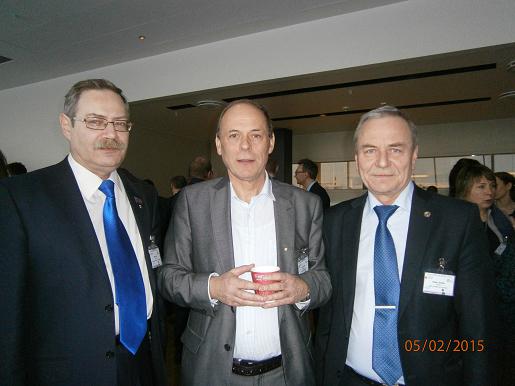The Kirkenes Conference gathers participants from Norway, Russia and other European countries and is regarded as a high-profile meeting place for politics and businesses in the borderland between east and west in the High North.
This year, the conflict in eastern Ukraine cast dark shadows over the event and discussions ran high both on the podium and in the conference corridors.
“We have to distance ourselves from Russia’s actions in Ukraine”, Norwegian Foreign Minister Børge Brende underlined in his speech at the conference, which took place this week. “Russia, whose border is just few kilometers from here, is the same country which is using force against its neighboring people of Ukraine. We cannot accept such policy”, he added.
A Russian response soon followed from Murmansk Governor Marina Kovtun. “For an overwhelming number of Russians, the military action in eastern Ukraine is perceived with personal heartbreak. I say this as a woman, as a wife of a Ukrainian, as a mother of children who speak both Russian and Ukrainian”, she said, adding that the conflict is a fight against nazism. “We equally understand the role of the Soviet forces who liberated eastern Finnmark from the German-fascist aggressors, however what is happening in Ukraine today has the same nazi nature”, the governor argued.
However, the tone between the politicians softened as soon as they reoriented towards their joint high north. This is a region of cooperation, and the sanctions must not put a stop to cross-border relations, they both consented.
Despite colder climate between east and west, the Barents cooperation with it’s people-to-people contacts across borders between the Scandinavian north and Russia contiunes as before. Minister Brende underlined that his government wants to preserve people-to-people cooperation, continue to facilitate visas and improve conditions for bordercrossing, work permissions, local border shopping and trade.
Just ahead of the event, he announced that his ministry allocates about 340 million kroner extra for the Norwegian Barents Secretariat, a company supporting cross-border cooperation in the region.
On her side, Marina Kovtun highlighted Murmansk Government’s commitment to continued Barents Cooperation. Cross-border relations in the region are unique for all of Europe, she said.
Murmansk and northern Norway are key stakeholder in the Barents Cooperation, the cross-border initiative which includes four countries and 13 regional administrative-territorial units.
Statements by the representatives of business community were more pragmatic: mainly devoted to the implementation of the projects in view of existing realities in the world market in the specific conditions of the North. In many speeches was the concern about the geopolitical situation, that interferes normal work, creates new threats and challenges. Under these conditions, the Finnish business intends to further develop cooperation with the Murmansk region in various fields, primarily in the mining industry - said in his speech Timo Rautajoki, President of the Lapland Chamber of Commerce, who appealed to the Norwegian colleagues proposing to seek new opportunities for cooperation and not to leave the Murmansk region.
Nadezda Kumashova, International department manager of the Northen Chamber of Commerce and Industry
At the photo (from left to right): Anatoly Glushkov, President of the Northern Chamber of Commerce and Industry; Timo Rautajoki, President and CEO of Lapland Chamber of Commerce (Rovaniemi, Finland) and Grigory Stratiy, Vice-Governor of the Murmansk Region
At the photo (from left to right): Sergey Veller, President of the Union of Industrialists & Employers, Arve Tannvik, Project Manager of Kirkenes Conference; Anatoly Glushkov, President of the Northern CCI



















